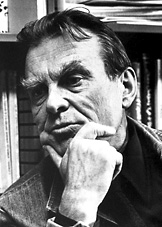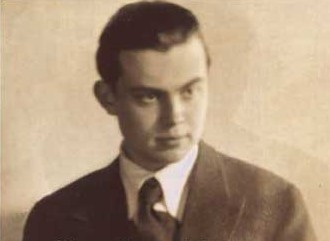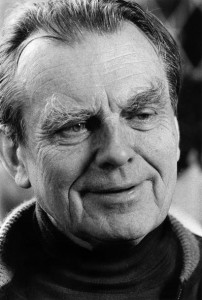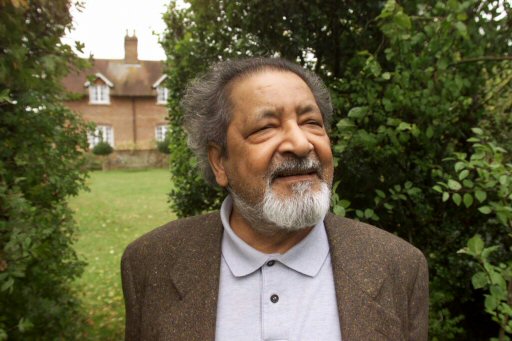The cloud that has chased me my whole life is the suspicion that the thing I don’t know is the crucial thing. Just yesterday, in the bookstore, I was looking for something by Mikhail Sholokhov, not seriously expecting to find anything but curious, having just seen a movie based on one of his short novels. Indeed, no Sholokhov, but in my idle searching, I came across a really big book called The Family Mashber, a supposed masterpiece written in Yiddish by a Soviet writer named Der Nister, who, a quick scan of his bio tells me, died in a Russian prison hospital in 1950. I read that the older of the two famous Singer brothers, I. J., said of Der Nister, “had writers of the whole world been given a chance to read his work, they would have broken their pens.” Unlike Sholokhov, who may or may not have actually written And Quiet 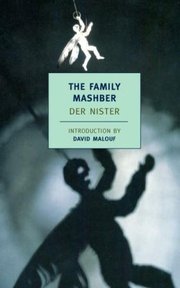 Flows the Don, the most famous novel attributed to his name, but who nonetheless became the most celebrated of all non-exiled Soviet writers, taking both the Stalin Prize for the dubious work, as well as the 1965 Nobel Prize, even lending his name to an asteroid, Der Nister, by contrast, seems to have produced the unambiguous real thing before dying at the hands that would applaud the other, then falling into near literary oblivion, giving his name to not so much as a tool shed. Like a stone skipping on the water, my heart beat fast for a few seconds, then sank. I’ve been bumbling about, I realized, doing relatively well, or so I had thought, in complete ignorance of this book. Now I have Cynthia Ozick haranguing me on the back cover of what she calls a masterwork, “as life-saturated as the other great Russian novels…an augmentation of world literature.” Great. Anyone want to tell me what else I’ve been missing? I’m talking here about a battle with mortality, the irrefutable fact that I will go to my grave not knowing, by parading orders of magnitude, far more than I will ever know. And so, against this day – may it remain far distant, though we all know that time is of the essence – I bought the book.
Flows the Don, the most famous novel attributed to his name, but who nonetheless became the most celebrated of all non-exiled Soviet writers, taking both the Stalin Prize for the dubious work, as well as the 1965 Nobel Prize, even lending his name to an asteroid, Der Nister, by contrast, seems to have produced the unambiguous real thing before dying at the hands that would applaud the other, then falling into near literary oblivion, giving his name to not so much as a tool shed. Like a stone skipping on the water, my heart beat fast for a few seconds, then sank. I’ve been bumbling about, I realized, doing relatively well, or so I had thought, in complete ignorance of this book. Now I have Cynthia Ozick haranguing me on the back cover of what she calls a masterwork, “as life-saturated as the other great Russian novels…an augmentation of world literature.” Great. Anyone want to tell me what else I’ve been missing? I’m talking here about a battle with mortality, the irrefutable fact that I will go to my grave not knowing, by parading orders of magnitude, far more than I will ever know. And so, against this day – may it remain far distant, though we all know that time is of the essence – I bought the book.
Knowing, in most case that spring to mind, is better than not knowing. But knowing can, in some instances, stand in the way of a more direct experience. Take the movie from a few nights ago, the one based on the Sholokhov short novel, Destiny of a Man. It was, I think, a very good movie, but a little knowledge kept me from a freer enjoyment, which in turn hindered a free assessment. Let me demonstrate what I mean: Without saying anything further about the movie, I’ll give you a brief, two-line exchange which occurs about forty-eight minutes in:
“Where did they teach him that kind of art?”
“Yeah, tomorrow it’ll be our turn.”
Any thoughts? Sounds a bit like two apprentices observing a master of their craft. Not knowing, your mind is free to wander. Two students at a conservatory discussing a performance by a great pianist? Young woodworkers marveling at the achievement of a master artisan?
Consider that it is between two prisoners looking on as their warden strolls before a line-up of fellow prisoners, choosing, apparently at random, victims to sock in the jaw, hard enough to make some of them collapse. See how a little knowledge changes things?
Now, picture this: The sun beats down on the wide, dusty prison yard. The camera is positioned at the far end of the line-up and you watch the commandant, whose name you have learned is Mueller, make his way towards you, as if you are waiting your turn. You’ve seen him insert a large coin in his left glove, the one he uses to deliver his violent blows. You watch men drop. Wheat before a combine. If a man only wavers, Mueller’s nostrils flare. The camera pulls back, and you discover you’ve been watching these proceedings through the dirty pain of a barracks window. On both sides, men are crouched on bunks. The first sentence is spoken by a man on camera left, seated on a lower bunk, tying strips of cloth around his ankles. The response comes from a man standing against a vertical beam on the right, holding a ragged cap in front of him. He looks sadly upward at no one. Then the men file out, off to the rock pits from which, at day’s end, some will not return.
Now you know what you are seeing, know what you are to feel. Actually, if you’ve watched from the beginning, you’ve known for some time. You’ve watched as the central character, Andrei Sokolov, grows from childhood to adulthood, marries a pretty village girl, has a family. You’ve seen him called away to fight the Germans. You’ve been with him as he gets captured, rounded up with other prisoners of war and herded into a bombed-out church. You’ve watched with appropriate horror as one of these prisoners, a young man desperate not to soil himself and equally desperate not to defile the holy place into which they’ve been packed, screams to be let out, and, after so making himself the object of German mirth, is shot dead as he claws at the church door. You’ve watched the grim unloading of trains to tango music, marveled at the Disneyland efficiency with which Jews are channeled through one set of barbed wire-lined gates and Russians through another. And you’ve seen the Jewish line, seemingly endless, disappear into a low brick building with a tall square chimney billowing black smoke.
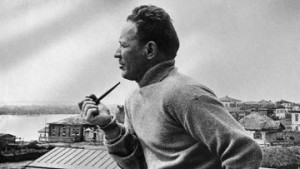
Still think you know this territory? Add this: Remember who wrote the story. Admit that it has been beautifully translated to screen in black and white. The director is Sergei Bondarchuk, famous in the West mainly for his staggering eight-hour long cinematic rendering of War and Peace. Bondarchuk, broad-faced and handsome, also stars. The film took top prize at the Moscow Film Festival in 1959. As well it should; it is a very good film. Not so infused with beautiful strangeness as Tarkovsky’s Ivan’s Childhood, or as passionately inventive as Kalatozov’s The Cranes are Flying, to name two Soviet films from the same period on roughly the same subject, but heartfelt, its message clear and direct. Andrei’s unofficial adoption, at the end of the film, of a small boy orphaned by the war has a strong impact while flirting with the sentimental, but the scene in which he refuses to drink to the Germans’ misguided belief in a victory at Stalingrad, toasting instead his own death, which he believes is immanent, by downing, on an empty stomach, three full-to-the-brim tumblers of Vodka poured by Mueller, and remains standing, must surely be one of cinema’s great “confrontation scenes.” I hope it is in Sholokhov’s book (I haven’t read it); it would do him credit.
Return now to this brief exchange between prisoners. Taking all into account, you’ll find that the sentences have accrued a complexity that neither Sholokhov (if the lines actually appear in his novel), nor Bondarchuk could have intended:
“Where did they teach him that kind of art?”
“Yeah, tomorrow it’ll be our turn.”
“Our turn” to receive the metal-fisted blow. Right? Or —to learn the art?

